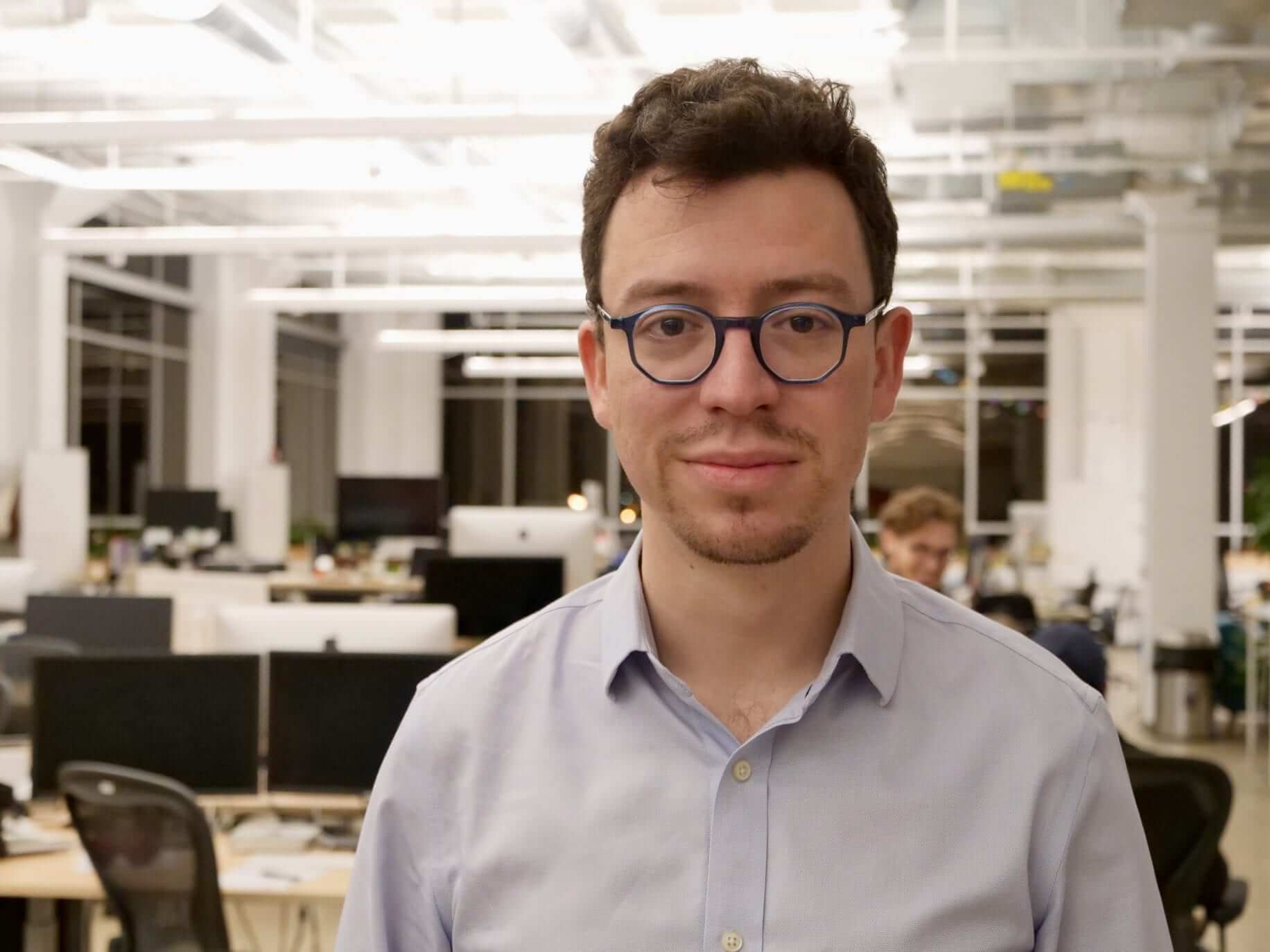“Hold on for Mr. Gates,” said his private secretary.
Good old Bill spent 45 minutes trying to convince Luis Von Ahn, a 20-something Guatemalan math professor, to come work for Microsoft. Yep — this stuck-in-puberty face told the world’s richest man to hold off. Politely.
The Matrix is Luis’s all-time favorite movie, which I respect. But people like me watch the Matrix and think damn, why can’t Morpheus just call me? What does this antisocial nerd have that I don’t? The difference between me and Luis is that doesn’t just admire the hero in sleek sunglasses — he also studies the efficiently totalitarian robots.
The combination, apparently, is an explosive one. CAPTCHAs — the annoying “now tell me if you’re human” speed bumps where you have to squint between a blurry 8 and a blurry B — are Von Ahn’s brainchild, which got implemented by Yahoo a week after its birth and bought by Google a few years later. And Duolingo — his second child — amassed a $20 million valuation 2 years into its launch, and is now worth $1.5 billion.
But both CAPTCHAs and Duolingo are just bait for us, the hamsters, to spin the Big Wheel of the Internet. Unknowingly, we’re collectively digitizing 2.3 million books per year, and translating years’ worth of CNN and NY Times content into other languages within weeks.
Welcome to the next evolution of our species. Welcome to Luis Von Ahn.
Users Digitize 2.3 Million Books Per Year Without Knowing It
CAPTCHAs came to be after a lead-researcher-slash-talent-scout from Yahoo came to Luis Von Ahn’s school one day to give a lecture called 10 Biggest Problems We Don’t Know How to Solve. One of their problems was spammers who would use automated software to create millions of fake email addresses to send out penis enlargement ads in heaps. Yahoo was the Google of the early 2000s, so a young tech-oriented Luis put his head to the task.
The solution was a neat one. One of his fellow PhD classmates told him that computers have a hard time understanding hand-written or typed texts. A human can more or less easily read even a blurry picture of a properly ridiculous handwriting, but software could not compete. So it would take an army of very dedicated humans to bypass CAPTCHAs.
Yahoo implemented the feature within a week. God knows how many millions it saved them. Luis was okay with a simple “thank you.”
But being a moral predator, he could not live with the idea of productive humans spending 500,000 hours a day just filling out CAPTCHAs. 500,000 hours a day is a lot of time — which, perhaps, could be put to good use.
A good use emerged. The archive.orgs and Google Books of the world spend their time trying to turn old scanned books, articles and documents into digitized e-versions. Books are made of words, words are made of letters, and so are CAPTCHAs.
Introducing reCAPTCHA. The previous version was the good old 9 h q 7 1 x blurry-to-digital interface. The new one gave users two words to discern. Both words are bits of scanned documents or books.
The company already knows what word is displayed on the first scanned bit. They give it to you to actually test whether you’re human. The second word is something they haven’t yet digitized. Once they have 10 real people enter the same word, they know it’s right.
This way, reCAPTCHAs digitize 2.3 million old books into editable, searchable web documents every year. Google purchased the company for an amount of money that rendered Luis not obliged to work ever again. The only thing he had to do is to stay at Google for 3 years. He didn’t.
Students Translate Centuries’ Worth of News Articles While Learning Languages
Education is a painful topic for someone born in a country where $200 is the average monthly salary. While supposed to equalize the opportunities for citizens, learning platforms often only increase the gap between the rich and the poor. It puts people into two seemingly innocent categories: those who have $500 to spend on an English language course, and those who don’t.
Those who do learn English, they tend to double their income, Luis says. In China alone there are 400 million people studying the language — that’s almost precisely the combined number of US and UK citizens. Besides the obvious reasons — the ability to freelance for US clients, for example — there are more undercurrent forces at work.
Most of the Internet is in English, which means that education itself becomes accessible only to those who know the language. The Yale courses on Youtube, the explainer videos, the Amazon books, the news sites, the blogs — we seldom stop to think how little of it is actually translated into our own language. 437 million people speak Spanish, but its Wikipedia equivalent is only about 20% of the size of the English version.
So when Luis decided to do something with the brainpower inside his skull, he partnered up with a guy named Severin Hacker to create a free way for most anyone in the world to learn the language. A democratized platform for anyone with an internet connection.
Now a seasoned entrepreneur, Luis knew that the free app needed a way to make money. His bankroll couldn’t fund the new business forever, so it needed to be self-sustaining from the get-go. Luis employed the mechanic he perfected with CAPTCHAs. He let us make money for him while teaching us a class.
When learning any language via Duolingo, you’re not just given random words. Sometimes, you’re given a random sentence to translate. Except the sentence you’re given is not random at all. It’s an excerpt from an article that belongs to one of Duolingo’s clients — like CNN or the NY Times.
Obviously, language learners aren’t certified translators. To make sure the translations are correct, Duolingo uses some behind-the-scenes alchemy to turn 10 amateur translations into one professional one. The end result is indistinguishable from what you’d get from a trained translator.
At the same time, besides the initial technology costs, it’s “free” translation. So if the NY Times paid $0.10 per word for their translations — and had to spend human capital on managing the process — Luis could swing by and offer translations for $0.05 per word. With enough users subscribed to Duolingo, it could translate a year’s worth of writing in a few days — which would gross $42,000 for Luis and his partner with every iteration.
Duolingo Is Moving The University to The Smartphone
The translation business is a sticky one, Luis says. There’s always a translator in the world ready to take over your job for half the price. Plus, Duolingo itself started resembling a translation company instead of an educational one. For these reasons, Duolingo nowadays is going the more traditional route of subscription.
Luis doesn’t particularly like to talk about how he grew Duolingo in terms of marketing, but, like any great builder, he spends a great deal of time pondering the core mechanics of his invention.
Apps — unlike classrooms, where students are effectively “held hostage” —have to battle for users’ attention with the ultimate opponents like Instagram or Facebook. Von Ahn and his partners dedicated 10 years perfecting each pop-up, each notification, each font and each sound to capture additional seconds of their users’ willpower.
For example, I remember using Duolingo for the first time in a while to practice some Chinese. I can’t remember what I was waiting for, but I was sitting at a coffeeshop I never usually sit at, at a time I never usually drink coffee. But I had some time to kill, and Duolingo seemed to fit the bill.
A week later, I found myself walking past the same coffeeshop at a similar time. That was the first time when Duolingo offered me to learn a few new words. Only later I realized it was exactly the same time and place I used Duolingo in for my first session.
Duolingo decision makers also have ambitions for the broader educational scene. Testing for certifications like IELTS or TOEFL is one particularly painful hurdle for the bright minds of the second and third world. Not only it costs money they don’t have to study and take the exam, students also often have to travel several hours to testing facilities. As a response, Duolingo is quietly working on making their own standardized test accepted by institution after institution.
Their key argument is that they’re better than the classroom. We have to take these numbers with a grain of salt, but Von Ahn says that a student can learn a semester’s worth of language in 32 hours on Duolingo. He explains the phenomenon via A/B testing: while tutors often adopt practices “just because,” Duolingo aggressively tests different learning approaches to see which one works best — like whether you should learn plurals or pronouns first.
But it’s not just languages that Von Ahn has his sights on. Every learning process that could be transplanted into the digital world at scale is a worthy pursuit for him, and any means — including learning by movie subtitles — is a viable option.
A Sprinkle of Machiavelli to Do Something Good
The Civil War in Guatemala was no joke. It lasted for 36 years — enough to raise an entire generation for whom barb wires around the house were normal. With a car stolen from someone in the family every other week, young Luis knew that going out after 6:30 PM was the equivalent of walking into the woods alone at night, 20,000 years ago.
Yeah, it’s safe to say that Luis was well familiar with what Carl Jung called the shadow. Nietzsche was more straightforward, and simply pictured it as a 7-feet abomination that lives within each and every one of us. Both thinkers agreed that within every man lives a plethora of dark, evil, pathetic, most cruel and self-serving of thoughts and instincts.
More importantly, both psychologists came to a conclusion that it is only through befriending those vile thoughts that humans can achieve something remarkable. Nietzsche called it Harmonious Totality, and imagined it as a river — which you can either “economize” to travel, generate electricity or fish; to simply ignore it and let it dry; or to drown in it. Jung gave his life to the pursuit of completion — a final result of the process of individuation — the process of befriending said vile thoughts, and accepting them deeply in your bones.
I wish Jung lived to meet Von Ahn. Both of his inventions — CAPTCHAs and Duolingo — are so progressive and forward-thinking that they make me feel like a tire technician (not that I have anything against tire technicians.) And they both employ just the right amount of Devil to be called Jesus-worthy.
About the Author
This submitted article was written by Alan Trapulionis, a writer at The Entrepreneur’s Handbook. See more of Alan’s work.





























